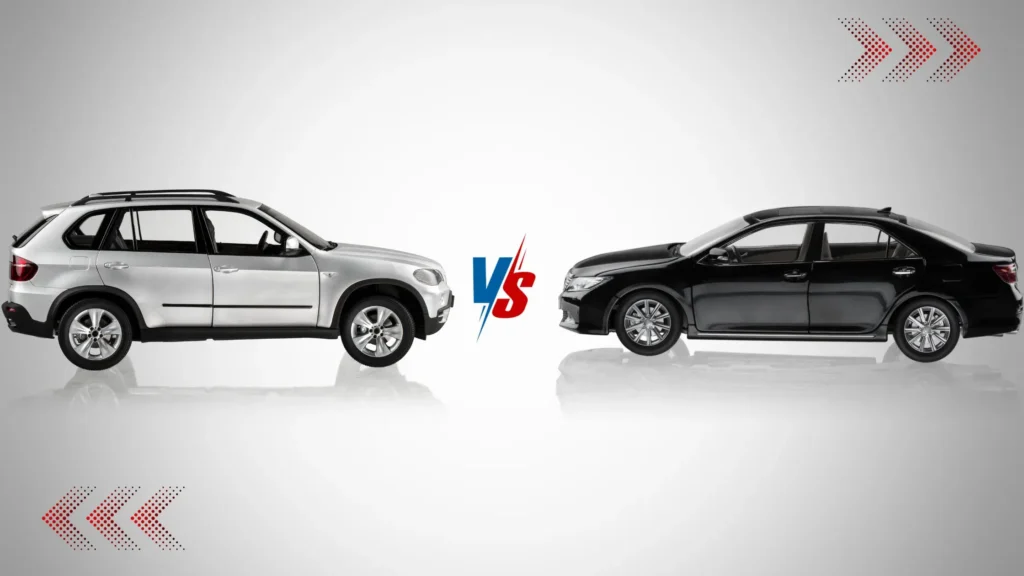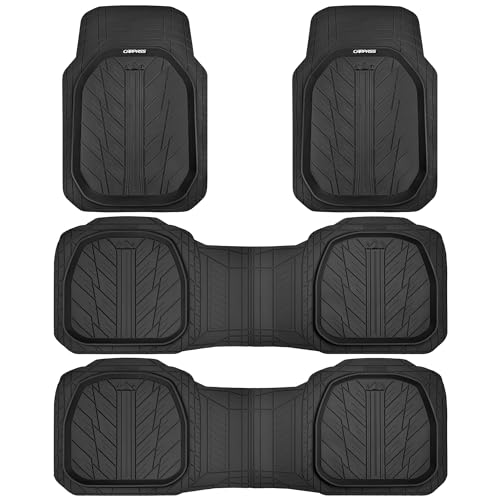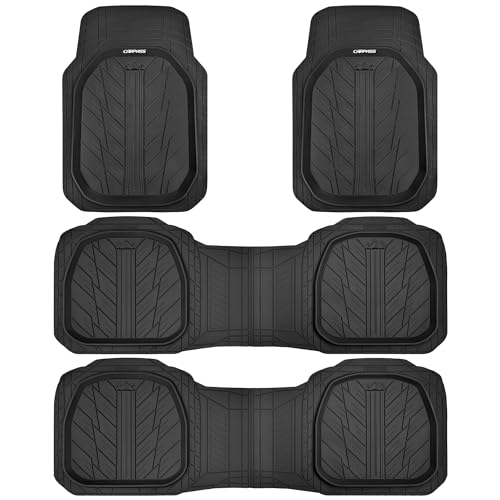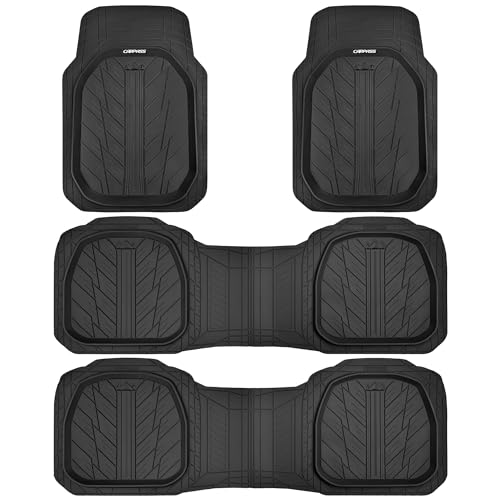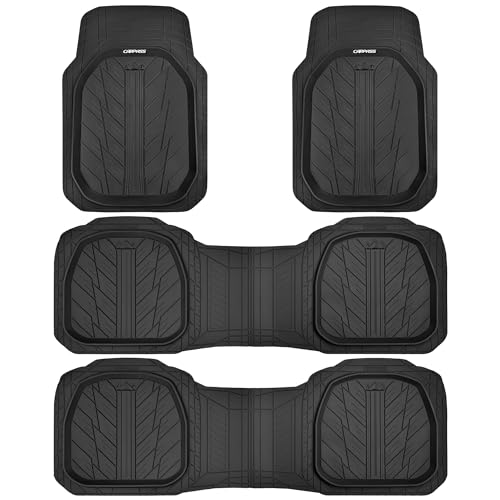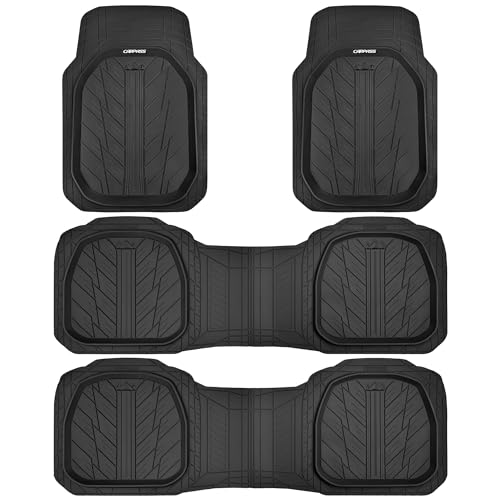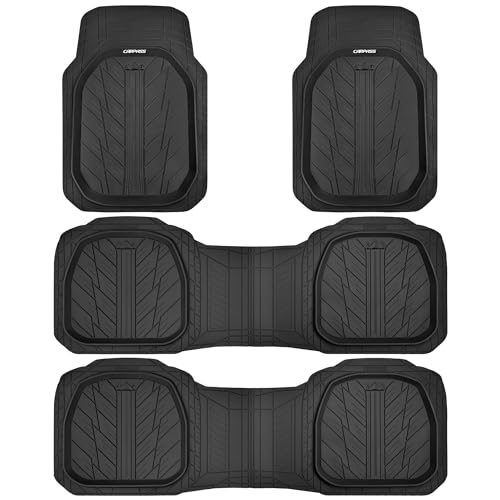Just over a decade ago, the idea of SUVs outselling sedans might have seemed far-fetched, yet here we are. With the SUV’s rise in popularity, largely due to their versatility and commanding road presence, they have fundamentally reshaped consumer preferences. This shift has prompted manufacturers to innovate in both categories, striving to balance performance, comfort, and efficiency.
Historically, sedans were the quintessential family vehicle, boasting better handling and fuel efficiency. However, as SUVs incorporated advances like hybrid powertrains, their appeal broadened significantly. A compelling statistic reveals that, as of 2022, SUVs accounted for 47.4% of global car sales, highlighting this paradigm shift in automotive trends.
| Feature | SUV | Sedan |
|---|---|---|
| Space | Ample interior with 7-8 seats | Compact interior with up to 5 seats |
| Fuel Efficiency | Lower, consumes more fuel | Higher, consumes less fuel |
| Handling | Good for off-road and various terrains | Better for city and highway driving |
| Cargo Space | Large and flexible | Limited to trunk size |
| Driving Position | Higher, offers better road visibility | Lower, more traditional driving feel |
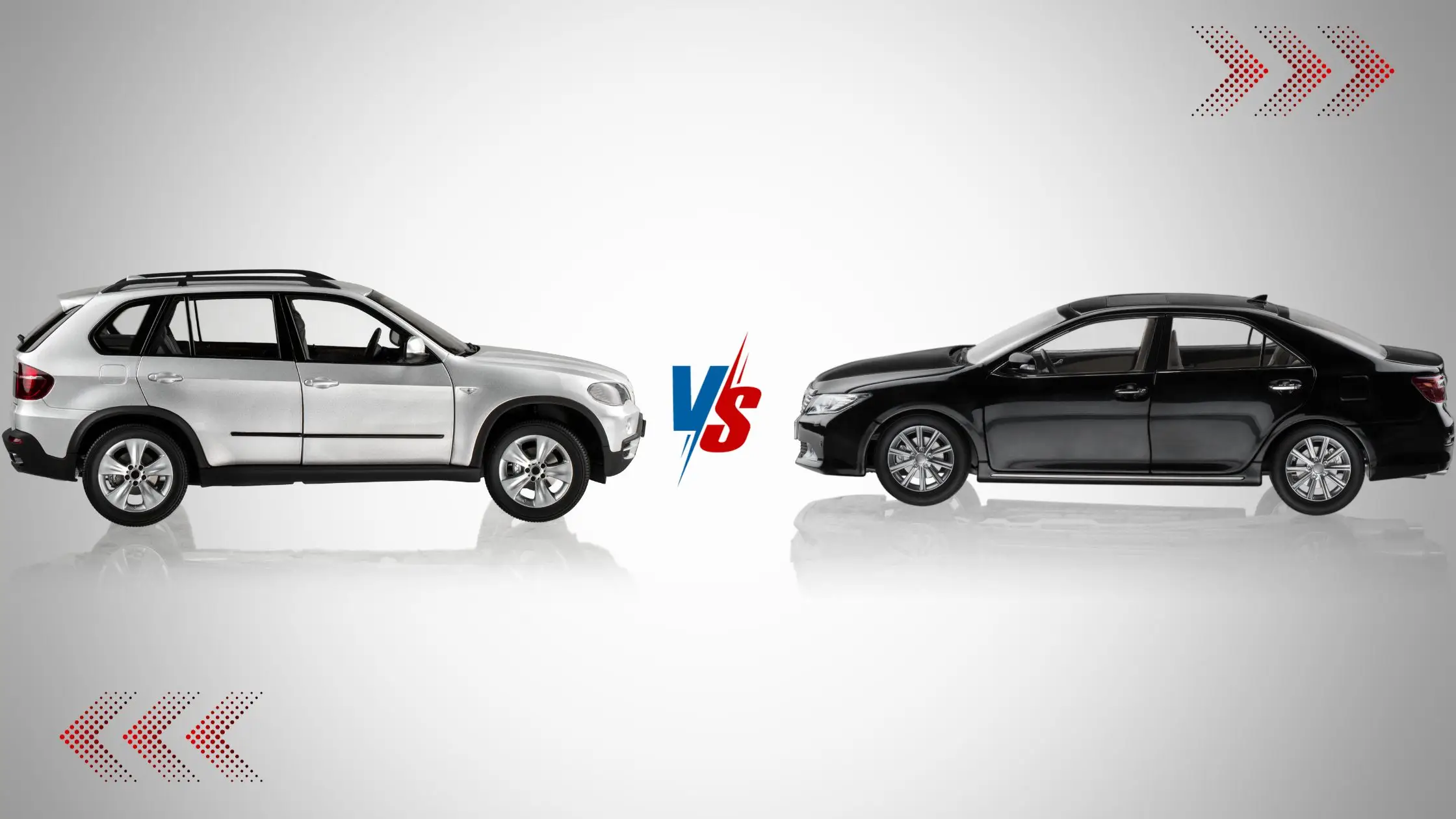
Overview of SUV and Sedan
SUVs and sedans are two popular types of cars. They each have unique features and serve different purposes. Let’s take a closer look at both.
Overview of SUV
SUV stands for Sport Utility Vehicle. They are known for their large size and strong build. Many families choose SUVs for their ample space and comfort.
SUVs often come with all-wheel drive. This makes them good for driving in different weather conditions. They are great for off-road adventures too.
Inside an SUV, you usually find a lot of room. They can often seat seven or eight people. There’s also plenty of space for luggage.
Modern SUVs come with lots of tech features. This includes touch screens, advanced safety systems, and more. They aim to provide a smooth and enjoyable driving experience.
One downside of SUVs is fuel consumption. Due to their size and weight, they usually consume more fuel. This can make them more expensive to drive compared to smaller cars.
Overview of Sedan
Sedans are typically smaller than SUVs. They often have a sleek, elegant design. Many people like them for their good fuel efficiency.
Sedans generally have four doors and a trunk. They are good for city driving. Parking them is usually easier than parking an SUV.
Sedans can be very comfortable too. They often have features like cushy seats and good climate control. They can be a great choice for daily commuting.
Despite being smaller, sedans still offer impressive tech features. You may find navigation systems, high-quality sound systems, and more. Safety is also a high priority in modern sedans.
The main downside is that sedans don’t offer as much space. They typically seat up to five people. If you need lots of cargo room or extra seating, an SUV might be a better choice.
Key Features Compared
SUVs and sedans each come with distinct features. These features affect their performance, comfort, and utility. Let’s compare some key features.

Space and Size
SUVs are known for their large size. They offer more space for passengers and cargo. This makes them popular for family trips and long drives.
Sedans, on the other hand, are smaller. They are easier to park and navigate in tight spaces. This makes sedans ideal for city driving.
While SUVs can typically seat seven to eight people, sedans usually seat up to five. The extra seats in SUVs are useful for larger families. This extra space can also be great for carrying sports gear or pets.
In terms of cargo space, SUVs usually have more room. This is convenient for transporting big items. Sedans have a trunk, but it offers less cargo space compared to an SUV.
Fuel Efficiency
Sedans generally get better gas mileage. They are lighter and more aerodynamically designed. This makes them more fuel-efficient.
SUVs, being larger and heavier, consume more fuel. This can make them more expensive to run in the long term. However, modern SUVs have improved with hybrid options to save on fuel costs.
If you’re concerned about gas expenses, a sedan might be the better choice. They offer good performance without guzzling fuel. This makes them cost-effective for daily commuting.
On the other hand, if you need the extra space and don’t mind higher fuel costs, an SUV could be worth it. They provide a different set of advantages, like more room and comfort.
Performance
SUVs often come with all-wheel drive. This helps them handle rough terrains and bad weather better. They are built to be versatile and robust.
Sedans come with front-wheel or rear-wheel drive. They are designed for smooth, comfortable rides on paved roads. This makes them perfect for everyday commutes.
SUVs usually have more powerful engines. This means they can tow heavier items like trailers or boats. They are a good choice if you need a vehicle with strong performance capabilities.
Sedans, while less powerful, offer nimble handling. This makes them fun to drive and easy to maneuver. Their lower center of gravity also makes them safer on sharp turns.
Safety
Both SUVs and sedans come with a variety of safety features. Modern vehicles have advanced safety systems like ABS and airbags. These are standard in both vehicle types.
SUVs have a higher driving position. This offers better visibility of the road. It can help drivers spot potential hazards more easily.
Sedans have a lower center of gravity. This makes them less likely to roll over in an accident. They are stable and balanced on the road.
Both SUVs and sedans include advanced safety technology. Examples are lane assist, adaptive cruise control, and collision warning. These features help keep drivers and passengers safe.
Technology
Both SUVs and sedans are equipped with modern tech features. This includes touch screens and navigation systems. They aim to make the driving experience enjoyable and convenient.
SUVs often have more built-in entertainment options. This makes long trips more fun for families. They might include rear-seat screens and premium sound systems.
Sedans also offer high-tech features. From quality sound systems to advanced climate control. They tend to focus more on comfort and ease of use.
Many SUVs and sedans now come with smartphone integration. This allows drivers to connect their phones to the car. It’s useful for playing music, taking calls, or using GPS.
Overall, the technology in both vehicles is designed to improve the driving experience. While SUVs might offer more family-oriented tech, sedans focus on enhancing comfort and efficiency for daily use.
SUV vs Sedan: Feature Comparison
When choosing between an SUV and a sedan, it’s important to compare their features. Each type has its own strengths and weaknesses. This table highlights some key differences between them.
| Feature | SUV | Sedan |
|---|---|---|
| Space | Spacious interior with 7-8 seats | Compact interior with up to 5 seats |
| Fuel Efficiency | Lower, consumes more fuel | Higher, consumes less fuel |
| Handling | Robust, good for off-road driving | Better for smooth, paved roads |
| Cargo Space | Large, spacious cargo area | Smaller trunk space |
| Safety | High driving position, better visibility | Lower center of gravity, less rollover risk |
| Performance | Powerful engines, all-wheel drive | Good maneuverability, front or rear-wheel drive |
| Technology | Entertainment options for families | Comfort and tech for daily commutes |
| Price Range | Generally higher cost | Generally lower cost |
| Versatility | Good for multiple terrains | Best for city and highway driving |
| Towing Capacity | Can tow heavy items like trailers | Limited towing capacity |
The Good and The Bad
SUVs and sedans each have their own advantages and disadvantages. Understanding these can help you decide which is best for you. Here’s a comparison of the good and bad aspects of both.
| Pros | Cons |
|---|---|
| Spacious interior (SUV) | Higher fuel consumption (SUV) |
| Better fuel efficiency (Sedan) | Less cargo space (Sedan) |
| Versatile for many terrains (SUV) | More expensive (SUV) |
| Good for city driving (Sedan) | Limited seating capacity (Sedan) |
| High driving position offers better visibility (SUV) | Higher risk of rollover (SUV) |
Price Comparison
The cost of owning an SUV or a sedan can vary greatly. Let’s compare the typical price ranges and what you might expect to pay. This comparison will help you understand the financial differences between the two.
| SUV | Sedan |
|---|---|
| Starting price often higher due to size | Generally more affordable starting price |
| Higher insurance premiums | Lower insurance premiums |
| More expensive maintenance and repairs | Less expensive maintenance and repairs |
| Higher fuel costs | Lower fuel costs |
| Better resale value due to popularity | Resale value varies, often lower than SUVs |
Which Is Better?
Choosing between an SUV and a sedan ultimately comes down to your personal needs and preferences. Both types of vehicles offer unique benefits that cater to different lifestyles. Understanding these can help you make an informed decision.
If you need a car for family trips or outdoor adventures, an SUV might be the better choice. They offer more space and are versatile enough for various terrains. However, keep in mind that SUVs generally cost more to run due to higher fuel consumption and maintenance costs.
On the other hand, if you’re looking for something more economical and easier to handle in the city, a sedan could be the way to go. Sedans are typically more fuel-efficient and easier to park. They are ideal for daily commuting and city driving.
Weighing the pros and cons, the choice is yours. Reflect on what matters most to you, whether it’s space, cost, or versatility.
Reasons why the SUV might be a better choice:
- More interior and cargo space for families and gear.
- All-wheel drive options make it versatile for various terrains.
- Higher driving position offers better road visibility.
Frequently Asked Questions
Understanding the differences between SUVs and sedans can help make the best choice for your needs. Below are some frequently asked questions that provide insights into these two popular vehicle types.
What are the main advantages of driving an SUV?
SUVs offer more interior space, making them ideal for families or those who need to transport a lot of gear. They also provide a higher driving position, which offers better road visibility.
Another advantage is their versatile performance. Many SUVs come with all-wheel or four-wheel drive, making them capable in various weather conditions and off-road situations.
How do sedans compare in terms of fuel efficiency?
Sedans generally excel in fuel efficiency compared to SUVs. This is due to their smaller size and lighter weight, resulting in lower fuel consumption and cost.
Sedans are often designed with aerodynamics in mind, further enhancing their fuel economy. They are an excellent choice for daily commuting and longer highway trips.
Are SUVs more expensive to maintain than sedans?
SUVs can be more expensive to maintain due to their larger size and more complex systems like all-wheel drive. Tire replacements, oil changes, and other routine services often cost more for SUVs.
However, advancements in technology have made modern SUVs more reliable and easier to maintain than older models. Always consider the specific model and its maintenance history when making a decision.
Which type of vehicle is better for city driving?
Sedans are generally better suited for city driving. Their compact size makes them easier to maneuver and park in tight urban environments.
Additionally, sedans’ fuel efficiency is an asset in stop-and-go traffic. They typically provide a more comfortable and smooth ride on paved city streets.
What safety features are common in SUVs and sedans?
Both SUVs and sedans come equipped with advanced safety features. Common features include airbags, anti-lock brakes, traction control, and advanced driver assistance systems like lane-keeping assist and collision warning.
SUVs offer the advantage of a higher driving position, enhancing road visibility and potentially reducing the risk of accidents. Sedans, with their lower center of gravity, provide stability and reduce the risk of rollovers, contributing to their safety profile.
Should You Buy a SEDAN or an SUV? (Animated)
Conclusion
Deciding between an SUV and a sedan ultimately comes down to your individual needs and preferences. Each vehicle type brings its own set of strengths and weaknesses. Recognizing these can help guide you in making an informed choice.
SUVs offer unparalleled space and versatility, making them ideal for families or those who love outdoor adventures. Sedans provide cost-efficiency and ease of driving, especially in urban settings. Both have essential features that cater to different lifestyles, ensuring there’s a perfect fit for everyone.

